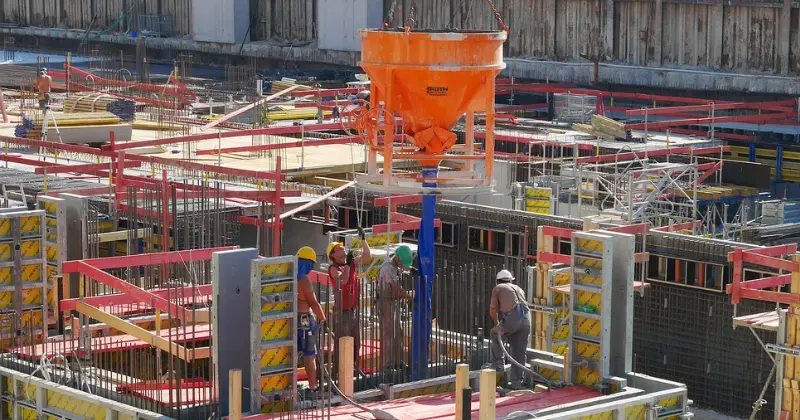10 mins read
Exploring The Importance Of Efficient Contractor Management
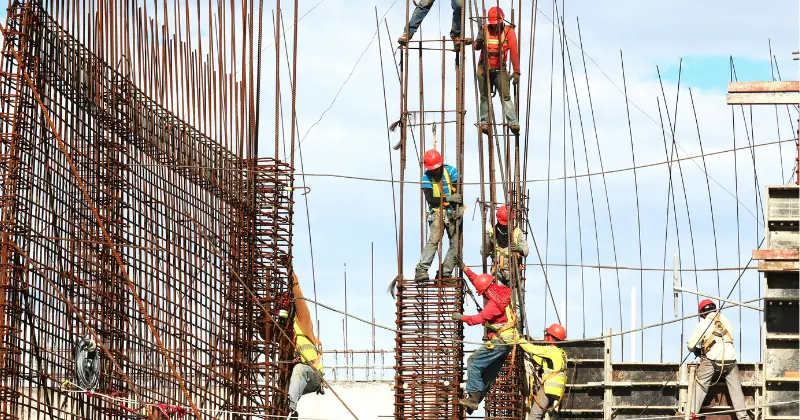
Managing the work of contractors and subcontractors before, during, and after a construction project is key to successful project execution, but the volume and scope of contract work can make effective management a daunting task. As the available tools and processes improve, contractor management has gone from being a cumbersome and time-consuming process to a streamlined and efficient system that provides continuous benefits for construction clients, project leads, and the contractors themselves.
But what is the true importance of efficiently managing contractors? In this RIB blog post, we’ll explore everything about the topic, including a definition, benefits, tips, and more!
What Is Construction Contractor Management?
Construction contractor management defines the systems, tools, and processes used to ensure contracted services on a construction project meet all performance and safety objectives. The selection, monitoring, and payment of contractors also fall within this scope.
A contractor is any external provider that performs work or completes services for a client, while a subcontractor is someone who is hired independently or by the general contractor to perform specific tasks as part of the overall project. Contractors and subcontractors are valuable specialized contributors in many different industries, but the nature of construction projects makes the work and management of independent contractors essential.
Contractor management systems have evolved to help clients and project managers track contractor project status, payments, estimates, training, and communication. Contractor management software has streamlined the process by keeping all important information in a single, centralized location, improving visibility, which is vital to construction project success.
Benefits Of Efficient Contractor Management In Construction Projects
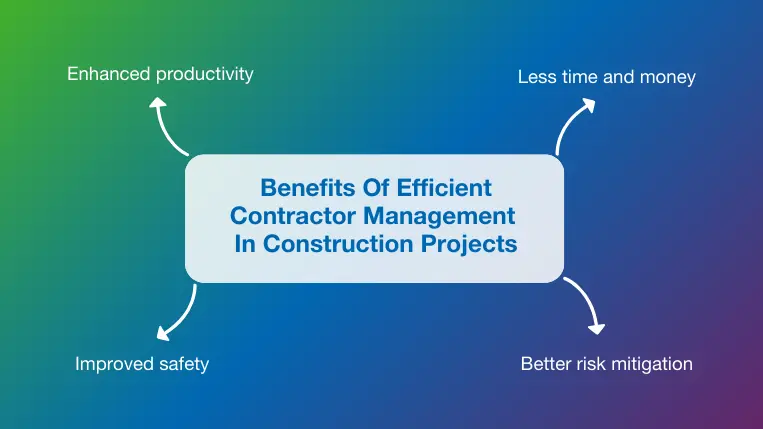
The construction industry relies on interconnected teams of contractors to meet their project goals on time and on budget while remaining safe and compliant. Although each contractor must take responsibility for fulfilling their own contracts and agreements, contractor management solutions make it easier to improve visibility and efficiency for these tasks. Let’s explore some benefits of efficiently managing contractors below.
Enhanced productivity
Construction productivity is the key to on-time project completion and satisfied clients in the building industry. Contractor productivity must be baselined and tracked regularly before it can be measured and improved. A contractor management platform can serve as a convenient repository for standardized metrics like contractor labor hours and task completion while improving the efficiency of administrative project tasks like payroll processing, scheduling, and resource allocation.
Less time and money
The productivity that comes from efficient contractor management in construction contributes to time and money savings when bottlenecks, delays, and overruns are avoided through improved contractor communication and awareness. Automating administrative tasks also saves money by freeing up staff to work on more important activities.
Contractor management systems also save time and money by improving project resource allocation. Construction software solutions help to define interdependencies between tasks and decide where material, labor, and equipment should be allocated at any given time. These capabilities help projects stay on time and within budget.
Better risk mitigation
Efficient contractor management reduces project risks by tracking contractor performance, insurance status, and compliance with requirements like OSHA in real-time. Contractor compliance management allows project leaders to identify and address any gaps before they lead to costly legal or operational issues. This process also reduces project risks by ensuring each contractor is aware of and adheres to company standards and policies.
Improved safety
Contractor safety management should always be the highest priority. Professional contractor software can be used to monitor safety training compliance while providing a channel to communicate any safety issues or hazards observed on the job site. Regular safety audits and inspections can also be tracked using contractor management software.
Steps for a Successful Contractor Management System
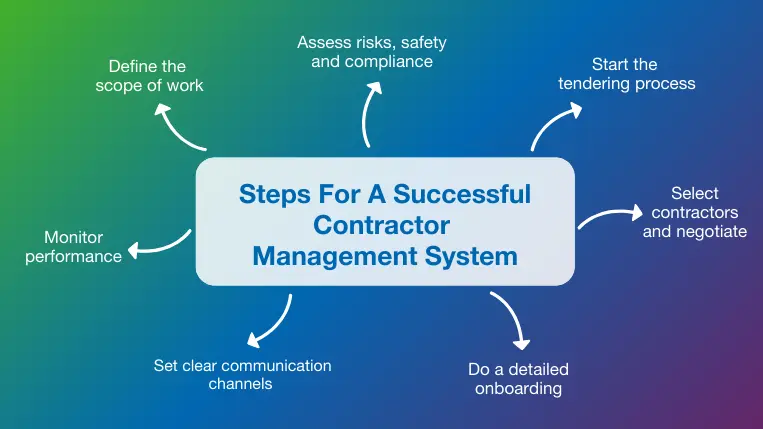
Construction contractor management involves software, systems, and a proactive mindset, but it is also a step-by-step process. Successfully managing contractors can mean different things depending on the project phase and the status of the contractor relationship. That is why implementing a well-thought-out system is of the utmost importance. Below are some key steps you should follow.
1. Define the scope of work
Establishing the scope of work (SOW) for each contractor upfront is essential for effective contractor management, budgeting, and project scheduling. An accurate and detailed SOW helps you identify and select contractors with the skills, insurance coverage, and track record that are appropriate for the task at hand.
2. Assess risks, safety, and compliance
Safety and compliance should always be carefully considered before the ground is broken. A risk assessment to identify hazards and ensure compliance with health and safety regulations should be completed as early as possible to create a safe and comfortable work environment. Contractor safety and compliance training materials and strategies should also be developed in advance to avoid delays and confusion once the project begins. Contractor management programs can reduce lost workdays and improve total recordable rates (TRRs) by enhancing job safety.
3. Start the tendering process
Tender solicitation and submission processes can easily become cumbersome for complex projects with many contractors and subcontractors onboard. Contract management software makes it easier to track the status of each tender, perform a tender leveling process to compare bids, and respond to all bidding contractors accordingly.
4. Select contractors and negotiate a contract
The tendering process is just the beginning since low bids can sometimes belie other contractor issues that require further investigation. Relevant experience, reputation, past performance, and customer service practices are among the areas where further due diligence is recommended. A contractor prequalification process to verify all licenses, insurance policies, and other requirements is essential to avoid delays or contractor changes downstream.
Once contractors are selected and vetted, the contract negotiation process can still be time-consuming and laborious without the benefit of contractor management software. Along with the scope of work, a strong contract should include each party’s responsibilities and liabilities, timeline expectations, project specifications, and the consequences of a breach of contract.
5. Do a detailed onboarding
Contractor onboarding is a bit different than onboarding permanent employees, but it should still include education and training on all company, site, and project rules and safety regulations. During onboarding, the licenses and other documents reviewed during prequalification are collected and verified, and the contractors are introduced to the other teams and stakeholders they will be working with. At this stage, supporting yourself with the right construction collaboration software is of utmost importance as these solutions provide a centralized location for efficient communication between contractors and all other project stakeholders.
6. Set clear communication channels
Communication is the common thread throughout the contractor relationship. Clear communication channels and expectations should be defined between the project’s teams of contractors and between each contractor and the project leaders. Regular updates and open dialogues help contractors identify and resolve issues quickly and ensure that all parties remain aligned. Communication in construction projects is always challenging, but with the right planning and tools to support it, it can be easily overcome.
7. Monitor performance
An ongoing verification process is the best way to know how contractors are performing against their budget, schedule, and the key performance indicators (KPIs) laid out for them. Contractor construction management also includes the monitoring and tracking of changes, compliance, safety, and engagement information through professional construction reports that paint a more complete picture of contractor performance.
What Can Contractor Management Software Do For You?
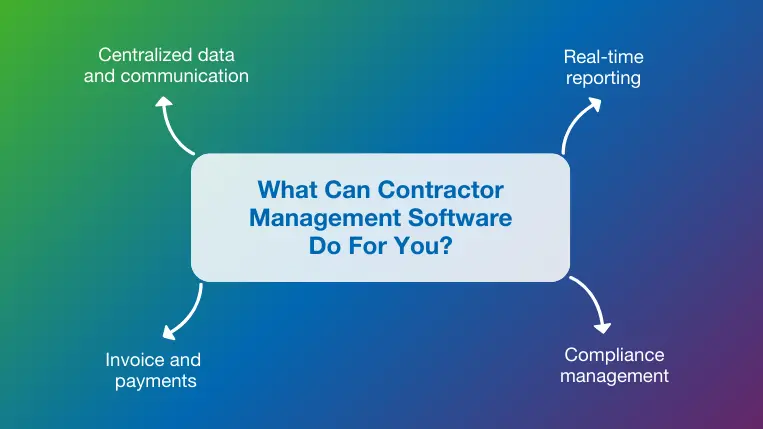
The best contractor management software won’t tell you how to manage contractors, but it will provide you with the tools you need to complete the most important steps more easily and consistently. Let’s explore what else these solutions can do for you!
Centralized data and communication
Contractor management software improves communication between contractors, project managers, and clients by establishing a centralized “source of truth” that all parties can rely on for the latest status and design information. Messages, notifications, and task assignments can also be sent through the software platform so that issues are addressed quickly and communication history is maintained.
Real-time reporting
The same source of real-time data used to improve project communication enables real-time reporting. Using the latest construction project information to assess and report on the progress and timeliness of all contractors supports performance tracking and data driven decision making. The software can generate status reports automatically based on the latest data or allow users to view KPIs and interactive dashboards on their mobile devices.
Compliance management
Contractor management software helps with compliance management by automating the tracking of permits, regulations, safety standards, and records that show up-to-date training and compliance. Having all important compliance data in one location makes it easier to address questions during inspections, while reminders and alerts help you recognize and close any gaps quickly.
Invoicing and payments
Invoicing and payment processing are streamlined through contractor management systems that minimize manual tasks like check issuance and invoice reviews. Contractor management software also reduces errors and delays in payment processing while ensuring compliance with tax regulations. This improved payment speed and accuracy helps to build positive relationships with contractors.
Boost Your Projects With Construction Contractor Management
Effective contractor management ensures all contracted services meet performance, safety, and compliance expectations. Advanced contractor management systems have transformed what was once a laborious, time-consuming process by using a more automated, centralized, and streamlined approach. These systems have become an essential tool for improving productivity, mitigating risks, and safeguarding construction project safety and morale.
That being said, successful contractor management is also about the people. Real-time project and training status, coupled with efficient resource allocation and scheduling, helps build a foundation of trust and collaboration in construction projects, leading to more successful and long-lasting relationships.
Our professional software, RIB CanBuild, mixes the capabilities of RIB Candy and RIB BuildSmart into a single specialized platform that combines project control and fully integrated enterprise management. Among many other features, RIB CanBuild offers powerful performance monitoring, contract review, and resource analysis for past and ongoing projects, making it an outstanding solution to boost productivity and efficiency. If you are ready to experience the power of an innovative construction management solution, book a demo for RIB products today!
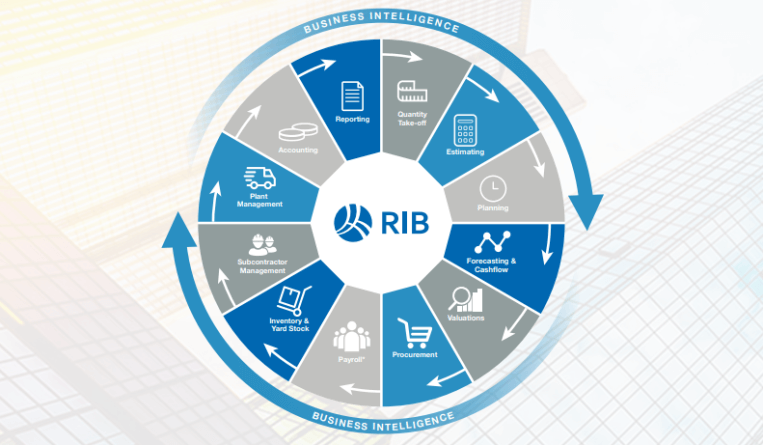
Most Recent
10 mins read
29 mins read
27 mins read
24 mins read
Blog Categories

Ebook



